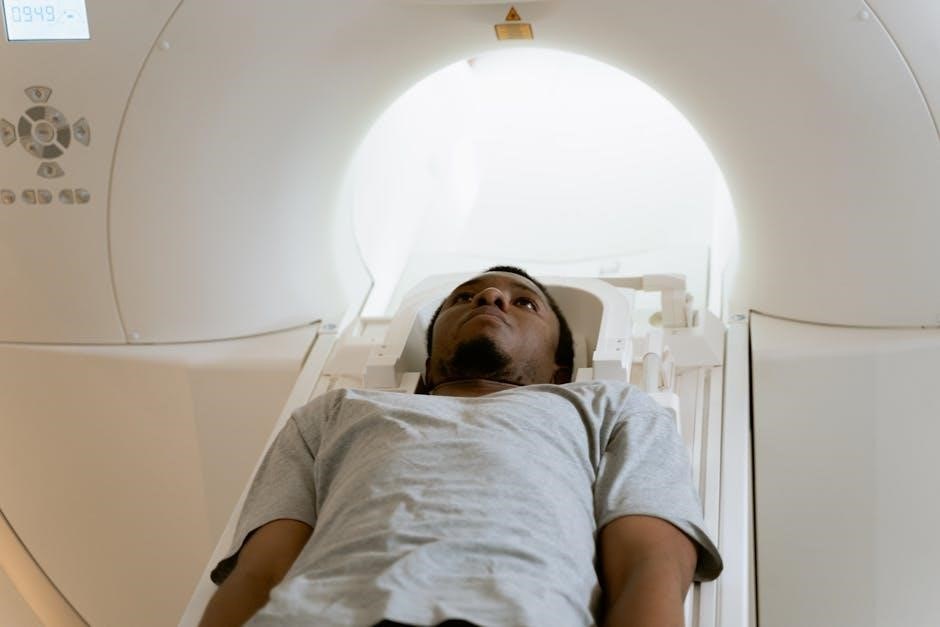A free DISC assessment PDF is a valuable tool for self-discovery, offering insights into your personality and work style. Based on the four main traits—Dominance, Influence, Steadiness, and Conscientiousness—it helps improve communication, productivity, and teamwork, making it ideal for personal and professional growth.
Overview of DISC Assessment
The DISC assessment is a widely recognized behavioral profiling tool designed to identify individual personality styles. It categorizes individuals into four primary traits: Dominance, Influence, Steadiness, and Conscientiousness. Each trait represents distinct behavioral patterns, helping users understand their strengths and tendencies. The assessment is often used for personal development, workplace communication, and team building. By analyzing these traits, individuals can gain insights into how they interact with others and adapt their behaviors for better relationships and productivity; The DISC model is simple yet effective, making it a popular choice for both personal and professional growth. Its practical applications span various fields, including leadership development, employee training, and conflict resolution. This tool empowers individuals to leverage their unique styles for enhanced effectiveness in all areas of life.
Importance of Using a Free DISC Assessment
Importance of Using a Free DISC Assessment
Utilizing a free DISC assessment offers numerous benefits for personal and professional growth. It provides individuals with a clear understanding of their behavioral tendencies, aiding in improved self-awareness and communication. By identifying strengths and areas for development, users can enhance their interpersonal skills, fostering better relationships. In the workplace, DISC assessments promote teamwork by helping colleagues understand each other’s styles, which can reduce conflicts and boost collaboration. For leaders, it serves as a powerful tool for effective management and decision-making. Additionally, the accessibility of free assessments makes it easier for anyone to gain valuable insights without financial barriers. This tool is particularly useful for those seeking to refine their leadership skills or improve their work environment. Overall, the DISC assessment is a practical resource for anyone aiming to enhance their personal and professional effectiveness.

What is a DISC Assessment?
A DISC assessment is a personality profiling tool that categorizes individuals into four main behavioral traits: Dominance, Influence, Steadiness, and Conscientiousness. It helps identify strengths, communication styles, and work preferences, providing insights into personal and professional behavior.
Understanding the Four DISC Personality Types
The DISC assessment identifies four distinct personality types: Dominance (D), Influence (I), Steadiness (S), and Conscientiousness (C). Each type reflects different behavioral tendencies. Dominance is characterized by assertiveness and a focus on results. Influence emphasizes enthusiasm, social interaction, and communication. Steadiness is marked by reliability, patience, and stability. Conscientiousness revolves around attention to detail, organization, and analytical thinking. These categories help individuals understand their strengths and areas for improvement, fostering better self-awareness and interpersonal relationships. By recognizing these traits, individuals can adapt their communication and work styles to collaborate more effectively with others. This framework is widely used in both personal and professional settings to enhance teamwork and productivity.
How the DISC Assessment Works
The DISC assessment is a straightforward, user-friendly tool designed to measure an individual’s behavioral preferences. It typically consists of a short questionnaire, often with 12-30 questions, that focus on various work-related scenarios. Respondents are asked to rate their preferences on a scale, indicating how they would act in different situations. The results are then analyzed to determine the individual’s dominant and secondary DISC traits—Dominance (D), Influence (I), Steadiness (S), and Conscientiousness (C). The assessment identifies the highest and second-highest scores, which define the individual’s personality style. This insights help users understand their communication preferences, decision-making processes, and work behaviors. The test is quick to complete, providing immediate, actionable feedback that can be applied to personal and professional development. Its simplicity and clarity make it a popular choice for self-assessment and growth.
Benefits of a Free DISC Assessment PDF
A free DISC assessment PDF enhances self-awareness, improving communication and productivity. It fosters teamwork by understanding others’ styles, providing actionable insights for personal and professional growth in a clear, accessible format.
Improving Self-Awareness and Communication
Understanding your DISC profile is a powerful way to enhance self-awareness, allowing you to recognize your strengths and weaknesses. By identifying your natural tendencies, you can adapt your communication style to connect more effectively with others. This awareness fosters better relationships, both personally and professionally, by helping you understand how others perceive you. Improved communication skills enable you to express yourself clearly, listen actively, and respond empathetically. This leads to fewer misunderstandings and stronger collaboration. Additionally, recognizing the communication styles of others allows you to tailor your approach, ensuring your messages are received as intended. A free DISC assessment PDF provides practical insights to refine these skills, empowering you to navigate interactions with confidence and clarity. This self-awareness is foundational for personal growth and effective teamwork, making it an invaluable tool for everyday interactions.
Enhancing Workplace Productivity and Teamwork
A free DISC assessment PDF is a powerful resource for boosting workplace productivity and fostering stronger teamwork. By understanding individual personality styles, employees can identify their strengths and weaknesses, enabling better task delegation and collaboration. Improved communication reduces misunderstandings, while recognizing team members’ preferences enhances trust and cooperation. Leaders can use DISC insights to tailor their management approach, ensuring each team member feels valued and motivated. This fosters a positive work environment where diverse perspectives are leveraged to achieve common goals. Enhanced teamwork and productivity lead to greater efficiency and innovation, making the workplace more dynamic and successful. Utilizing a free DISC assessment PDF empowers organizations to create a culture of understanding, collaboration, and shared success.

How to Take a Free DISC Assessment
A free DISC assessment is a quick and easy way to evaluate your personality style. Complete a short questionnaire to receive insights into your communication and work preferences.
Step-by-Step Guide to Completing the Test

Completing a free DISC assessment PDF begins with accessing the online test. Answer a series of questions honestly, focusing on your typical behavior and preferences; Once finished, submit the form to generate your personalized profile. The results will categorize you into one of the four DISC styles: Dominance, Influence, Steadiness, or Conscientiousness. Use this insight to enhance self-awareness and improve interactions with others. The process is straightforward and designed to provide clear, actionable feedback. By following these steps, you can gain a deeper understanding of your personality and work style, enabling personal and professional growth. This guide ensures a smooth and effective experience when taking the assessment.
Interpreting Your DISC Profile Results
Interpreting your DISC profile results involves understanding how your scores align with the four main personality styles: Dominance, Influence, Steadiness, and Conscientiousness. Your results will highlight your strengths, tendencies, and areas for improvement. The assessment typically provides a detailed breakdown of your scores, showing where you fall on each of the four dimensions. The highest score indicates your dominant trait, while the second-highest reveals secondary tendencies. This insight helps you identify how you interact with others and approach tasks. Understanding your profile allows you to leverage your strengths and work on weaknesses. Many free DISC assessments include resources or guides to help you interpret your results effectively. By analyzing your profile, you can improve communication, enhance teamwork, and make informed decisions for personal and professional growth. This interpretation is key to maximizing the benefits of the DISC assessment.
Applications of Free DISC Assessment
A free DISC assessment PDF is widely used for improving workplace communication, teamwork, and leadership development. It aids in team building, recruitment, and personal growth by understanding individual work styles.
Using DISC for Personal Development
A free DISC assessment PDF is a powerful tool for personal development, helping individuals gain self-awareness and understand their behavioral tendencies. By identifying strengths and weaknesses, users can improve communication skills, emotional intelligence, and decision-making abilities. The assessment provides insights into how individuals approach challenges and interact with others, enabling them to adapt their behaviors for better relationships and career growth. Many use the DISC framework to set personal goals, enhance teamwork, and foster a deeper understanding of their work style. This self-awareness empowers individuals to leverage their natural traits while addressing areas for improvement. Whether for career advancement or personal growth, the free DISC assessment offers a clear roadmap for self-improvement and lifelong learning.

Implementing DISC in Workplace and Leadership
Implementing a free DISC assessment PDF in the workplace and leadership roles can significantly enhance team dynamics and productivity. By understanding the DISC profiles of employees, leaders can tailor their communication and management styles to meet individual needs, fostering a more collaborative environment. This tool helps leaders identify strengths and potential challenges within their team, enabling better task delegation and conflict resolution. In leadership, DISC assessments promote empathy and adaptability, allowing leaders to inspire and motivate diverse personalities effectively; Additionally, it aids in building balanced teams by combining different personality types to achieve common goals. By integrating DISC insights, organizations can create a culture of understanding and mutual respect, leading to improved performance and employee satisfaction. This approach not only strengthens leadership but also empowers teams to work cohesively toward shared objectives.

